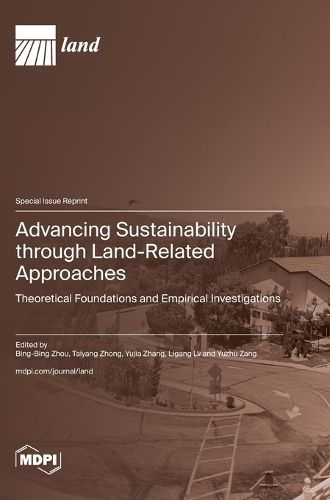Readings Newsletter
Become a Readings Member to make your shopping experience even easier.
Sign in or sign up for free!
You’re not far away from qualifying for FREE standard shipping within Australia
You’ve qualified for FREE standard shipping within Australia
The cart is loading…






This title is printed to order. This book may have been self-published. If so, we cannot guarantee the quality of the content. In the main most books will have gone through the editing process however some may not. We therefore suggest that you be aware of this before ordering this book. If in doubt check either the author or publisher’s details as we are unable to accept any returns unless they are faulty. Please contact us if you have any questions.
The aim of this reprint is to immerse the reader in the latest scholarly advancements at the intersections between sustainability science and various land-related sciences (e.g., land system science, landscape ecology, natural resource management, geography, public administration, etc.); furthermore, it aims to illustrate how these fragmented research intersections form a coherent research field with a unique niche for producing actionable sustainability knowledge. The featured contributions cover diverse topics such as farmland protection, farmland use efficiency, the spatial justice of urban green spaces, landscape ecological security, agro-farmland sustainability, sustainability dynamics of rural land systems, challenges amid coupled urban growth and shrinkage, changing paradigms of sustainable urban fringe systems, spatial governance of rural-urban systems, and the under-researched governance of marine space. These seemingly distinct topics fall into four complementary land-based governance levers (i.e., rebuilding capital stocks, redirecting interaction flows, reforming governance architectures, and re-/co-piloting sustainability transitions) for advancing weak/strong sustainability from the local to the global scale. Each study offers either empirical evidence or theoretical insight-often both-that collectively reveals how land is not just a passive substrate but a powerful governance toolbox that merits timely recognition for achieving sustainability. This reprint serves as both a reference and a call to action for researchers, practitioners, and policymakers to harness the full potential of land-related approaches.
$9.00 standard shipping within Australia
FREE standard shipping within Australia for orders over $100.00
Express & International shipping calculated at checkout
This title is printed to order. This book may have been self-published. If so, we cannot guarantee the quality of the content. In the main most books will have gone through the editing process however some may not. We therefore suggest that you be aware of this before ordering this book. If in doubt check either the author or publisher’s details as we are unable to accept any returns unless they are faulty. Please contact us if you have any questions.
The aim of this reprint is to immerse the reader in the latest scholarly advancements at the intersections between sustainability science and various land-related sciences (e.g., land system science, landscape ecology, natural resource management, geography, public administration, etc.); furthermore, it aims to illustrate how these fragmented research intersections form a coherent research field with a unique niche for producing actionable sustainability knowledge. The featured contributions cover diverse topics such as farmland protection, farmland use efficiency, the spatial justice of urban green spaces, landscape ecological security, agro-farmland sustainability, sustainability dynamics of rural land systems, challenges amid coupled urban growth and shrinkage, changing paradigms of sustainable urban fringe systems, spatial governance of rural-urban systems, and the under-researched governance of marine space. These seemingly distinct topics fall into four complementary land-based governance levers (i.e., rebuilding capital stocks, redirecting interaction flows, reforming governance architectures, and re-/co-piloting sustainability transitions) for advancing weak/strong sustainability from the local to the global scale. Each study offers either empirical evidence or theoretical insight-often both-that collectively reveals how land is not just a passive substrate but a powerful governance toolbox that merits timely recognition for achieving sustainability. This reprint serves as both a reference and a call to action for researchers, practitioners, and policymakers to harness the full potential of land-related approaches.